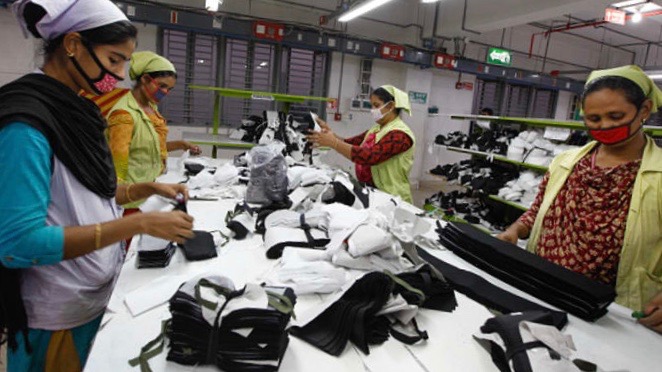The novel coronavirus pandemic has adversely affected hundreds of thousands of garment industry workers in Bangladesh, who are facing massive job losses. According to a recent study conducted by the Center for Global Workers Rights, “millions of workers are at greater risk of losing their jobs” due to global brands “demanding price cuts and delaying payments to suppliers.” Thousands of garment workers have already been laid off without “severance or furlough pay.”
According to the Bangladesh Garment Manufacturers and Exporters Association, nearly 1,150 factories have been severely hit due to the pandemic, resulting in as many as 71,000 workers losing their jobs in the past three months. The trade association noted that orders worth USD 3.18 billion have been cancelled since the crisis. Between March and June 2020, Bangladesh has lost USD 4.9 billion worth of garment production compared to last year’s figures.
Bangladeshi garment workers have also faced unprecedented repression for the past several months, with employers targeting union activists and dismissing workers on a regular basis.
Since mid-January, thousands of workers have been participating in demonstrations across the country, demanding that their monthly salary be doubled from 8,000 Tk to 16,000 Tk (USD 191) per month.
Instead of addressing the workers’ legitimate demands, the authorities have repeatedly responded with the use of force, resulting in dozens of casualties. Several garment workers have been arrested on false charges. A database of workers, created with good intent, has been used to blacklist workers, revealing a pattern of harassment.
On October 17, Saturday, hundreds of garment workers, mostly women, protested in national capital Dhaka demanding new labor laws for protection from workplace sexual abuse and harassment. Almost 85% of the workforce in the textile industry in Bangladesh comprises women, who largely work in the absence of basic amenities and without proper enforcement of laws granting maternity leave and other benefits. Workers also demanded that the authorities encourage companies to provide worker-friendly spaces, where women do not face structural abuse, intimidation and threats.
According to the Center for Global Workers Rights study, brands and retailers are “leveraging desperation” on part of the garment suppliers to demand steep discounts on new orders as buying begins to pick up again. Suppliers are being asked to make prices an average 12% cheaper than last year.
As per the survey conducted across 75 factories in 15 countries including Bangladesh, suppliers “had to wait an average of 77 days for payment, compared with 43 days before the pandemic, raising fears of further factory closures in an industry employing 60 million people worldwide.”
Another survey conducted by Subir and Malini Chowdhury Center for Bangladesh Studies targeting 1,057 garment workers concluded that the pandemic has affected the most vulnerable sections, and has been particularly detrimental for women in garment factories, most of whom are working at the very bottom of the global supply chain.
77% of the garment workers interviewed in the survey admitted that the COVID-19 crisis in Bangladesh has made “feeding everyone in their household” difficult. 52% of the respondents claimed that they saved less than what they did in February.
Bangladesh’s textile industry is the second largest in the world after China, with exports in 2018 valued at almost USD 30 billion. Though the industry has seen rapid expansion in the recent years, its workers have been finding it difficult to make ends meet.





